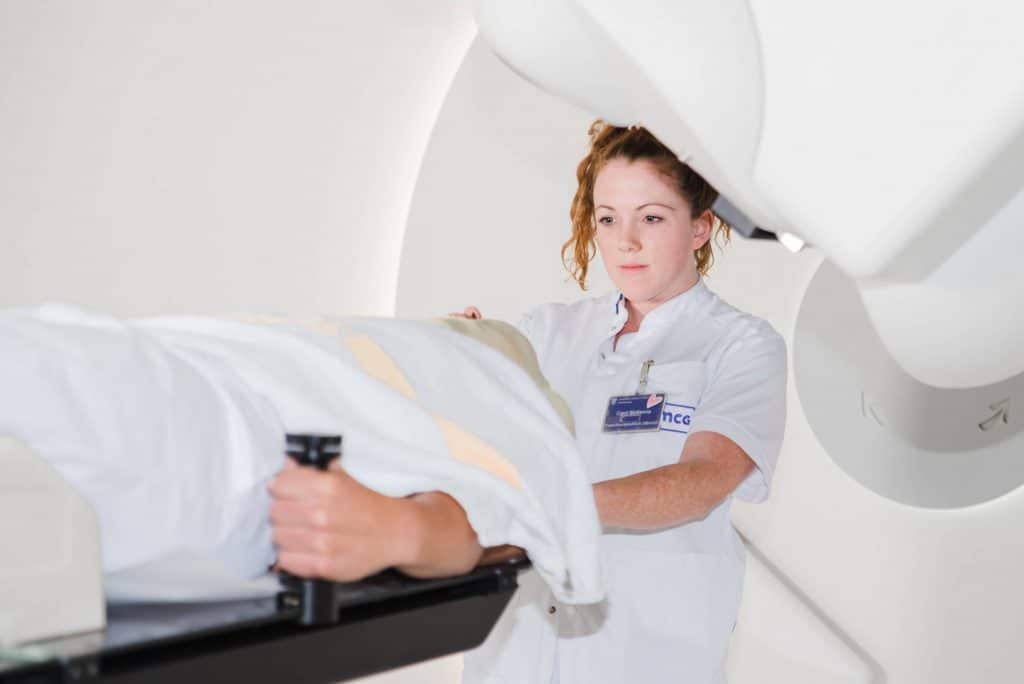Advanced use of Magnetic Resonance Imaging in Adaptive Intensity Modulated Proton Therapy
Planned secondments: MedPhoton(Austria), PSI (Switzerland), Raysearch (Sweden)
Project description
Magnetic Resonance Imaging (MRI) has numerous advantageous properties over X-ray Computed Tomography (CT) imaging such as higher soft-tissue contrast and the lack of radiation dose. However, CT imaging is routinely used in proton therapy treatment verification, as it can be used for proton dose computation. New developments in MRI imaging may overcome this drawback and improve treatment verification for future proton therapy patients. In addition, novel imaging techniques which localize and quantify biological damage can contribute to more clinically relevant triggers for proton therapy plan adaptation.
In this project, the researcher will modify and apply previously developed artificial neural networks to generate synthetic CT scans from MRI images to enable dose computation (i.e. machine learning). Next, changes in the MRI scans will be related to biological dose distributions and triggers for proton therapy plan adaptation will be developed. Finally, novel functional imaging techniques to assess biological damage and to monitor the treatment will be investigated.
The successful candidate will be enrolled in the Cancer Research Center Groningen (CRCG) Research Institute of the UMCG, under the supervision of Prof. Stefan Both. The UMCG is one of the largest hospitals in the Netherlands. It is a non-profit educational and research organization and part of the University of Groningen (UG).
As part of the CRCG, the ESRs will be embedded in the department of Radiation Oncology, which has a strong track record in the development and validation of prediction models describing the relationship between complex 3D-dose distributions and the risk of radiation-induced side effects. Research activities related to photon as well as to proton therapy are accommodated within GRayLines, an integrated research program including technology development, imaging, clinical studies, radiobiology and HTA. As such, the UMCG provides an ideal environment to merge technological developments with basic, translational and clinical science, and transferable skills.
For more information concerning the research project please contact: Stefan Both


Arthur Galapon
Early-Stage Researcher at the University Medical Center Groningen
My name is Arthur Galapon Jr, a Filipino and currently working as an early-stage researcher at the University Medical Center Groningen, under the supervision of Dr. Stefan Both. Academically, my degrees are all about physics – applied, medical, and nuclear. Personally, I enjoy doing electronics projects, listening to audio books, playing board games, and visiting science centers and museums around the world.
My work involves integrating the advantages offered by magnetic resonance imaging (MRI) in the adaptive proton therapy workflow. The first step is to develop a fast and accurate way of transforming MRI images to synthetic Computed Tomography (sCT) images using machine learning techniques. Further along the project, the goal is to utilize advanced MR-imaging techniques to assess the biological damage which can help provide indicators to trigger plan adaptation.
The way science improves people’s lives always fascinated me – especially how physics can be used in medicine. My dream is to push the boundaries of medical physics the same way humans have explored space. This PhD is the first step to making it a reality. Let me take you along the next ones!

University Medical Center Groningen (UMCG)
PROJECT BENEFICIARY
The UMCG is one of the largest academic hospitals in the Netherlands and the first to offer proton therapy. Innovative cancer treatment is one of our key research areas. In the field of Radiation Oncology we focus on high precision, innovation and healthy ageing of cancer survivors.
